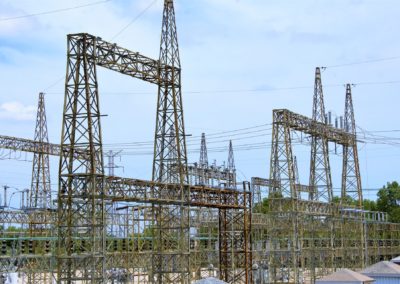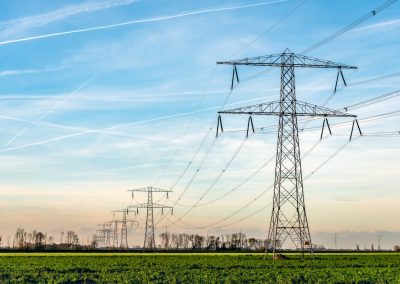Race to Net Zero emissions
In June 2019, the UK government became the first major economy to legislate to reach net zero greenhouse gas emissions by 2050, per the Paris Agreement. In their 6th Carbon Budget, the government set in law the world’s most ambitious climate change target, cutting emissions by 78% by 2035 – compared to 1990 levels to take the UK over 75% of the way to net zero by 2050.
Reducing the reliance on fossil fuels for energy supply, worldwide, was also a key talking point at COP26.
This transition requires innovative thinking – and Imperial has the experts across the energy mix who can help solve the challenges of emerging or existing businesses, as well as policy and regulatory decision makers, and investors.
Read on to see what we can do – or contact us today with your specific need and see how we can help you.
Commentary in the energy sector
Imperial is well-placed to provide both specific and holistic insights into how policies should be designed, enacted and enforced.
- The UK’s future energy mix: What will it look like if we’re to reach Net Zero? By experts from the Energy Futures Lab
- Powering Net-Zero Britain – key to the UK’s net-zero emissions economy is a carbon-neutral electricity supply by 2035, requiring a significant transformation of the sector. Modelling from the IDLES Programme points to cost-efficient portfolios of electricity generation and storage technologies, and looks at the scale of investment needed in offshore wind and battery storage, the roles of nuclear energy and zero-carbon fuelled generation, plus direct air-capture.
- Planning sustainable energy solutions. As countries move towards net zero emissions, governments and businesses must make key decisions regarding the future of energy networks. Prof Green and Dr Iain Staffell have created economic and energy models that can quickly provide accurate information to help inform these decisions.
- Electric Insights, developed with Drax by Dr Iain Staffell, from Imperial’s Centre for Environmental Policy, provides real-time analysis of the source of the UK’s electricity supply, supported by quarterly reports that inform pricing, policy and improving the environmental sustainability of the power sources. The project helps inform government, consumers and stakeholders.
Future energy systems and market disruption
- Strategic insights into energy systems, demand, markets and technologies including supply and water technologies
- Decision making under uncertainty and futures approaches (including horizon scanning, backcasting and scenarios)
- Scenario building and business model stress testing
- Consumer benefits and impacts insight
- Energy regulation
Our experts in action. Ask us how they can help you.
Wind Power
Gas. Interim solution?
Off-grid energy consumption, such as transportation, will be the next significant challenge that energy suppliers face. Sustainable Gas Institute report explores the flexibility of gas as an energy source, not only for power production. Gas energy storage has a role to play to reduce the impact of surge-production of electricity from renewable sources – helping balance the levels of power created to the levels needed and consumed. Prof Adam Hawkes also provides courses tailored to senior management on methane science, reduction strategies and planning, measurement techniques, technology and policy.
Nuclear’s role in Net Zero
The potential from nuclear power stations goes beyond electricity generation to include heating homes, producing hydrogen, and initiatives to support industry’s adoption of low-carbon fuel supplies. Read Nuclear cogeneration: civil nuclear energy in a low-carbon future led by Professor Robin Grimes. Services include seismic hazard and nuclear safety assessments, medical isotopes, safety technology for reactor criticality and repositories, encapsulation and building materials, safety of reactor design and of legacy waste storage.
Hydrogen – Fuel of the future?
Hydrogen is light, storable, and produces no direct CO2 emissions when converted into energy. Today, most demand comes from the refining industry and chemicals companies – but growth could come from areas hard to electrify, such as the heating of commercial and residential buildings, and long-haul trucking. And hydrogen heating our homes is not as far-fetched as it sounds, with manufacturers starting to produce ‘hydrogen-ready’ boilers in anticipation of a future fuel shift. Read about the landscape of hydrogen technologies and policies including blue and green pathways
Flexibility in Britain
Prof Strbac’s and Dr Pudjianto worked with Carbon Trust on The Flexibility in Great Britain report – “a groundbreaking analysis of the future net zero energy system in Great Britain with profound implications for policymakers, households and the wider energy sector.” The worked was backed by a cross-sector group of key players including EDF, GLA, SSE Networks – and reviewed by BEIS, the Climate Change Committee, Innovate UK, National Grid ESO and Ofgem. Carbon Trust’s press release.
Hydro
In a report for renewable energy generator and developer SSE Renewables, Professor Goran Strbac and Dr Danny Pudjianto have shown that long-duration pumped hydro storage could reduce the gross cost of delivering a net zero energy system by up to £690 million. They store power generated by renewables by electrically pumping water to an elevated height and releasing it to generate electricity when needed. They can store energy for a duration of days – making up for sustained shortfalls in wind or sun better than battery technologies that only store energy for hours. SSE Renewables’ press release
Oil & Gas Services
As well as training courses on methane science, reduction strategies, measurement techniques, technology and policy; our experts also advise on gas condensates, well systems, blowdown simulations and analyses, seismic data processing, imaging and interpretation, reservoir engineering physics, petrophysics, process and environmental engineering and process optimisation.
Solar
New data set will help governments or organisations identify solar power ‘hot-spots’ to mobilise investment for new solar panels and increase adoption. Scientists are developing ways to use solar energy to create hydrogen for heating and industrial processes. New study finds solar collectors that split sunlight significantly more efficient at generating combined thermal and electrical energy.
Biofuel
The Hallett Group have been developing ionic liquid technologies to treat biomass from dedicated bioenergy crops such as willow. Fast-growing willow trees are cultivated to become renewable biofuels for motor vehicles, heating systems and industry. Sugars can be extracted from the cell walls of willow trees, to ferment and turn into ‘bioethanol’ Read more.
Our consultants are world-leading experts in their field, committed to on-going research. Contact us today to see how they can you achieve your Net Zero goals.
Contact us with your need:

Vibhor Jajoo
Engagement Manager
For Chemical Engineering, Earth Sciences, Bio-Engineering, Bio-Tech and Medical Devices.








